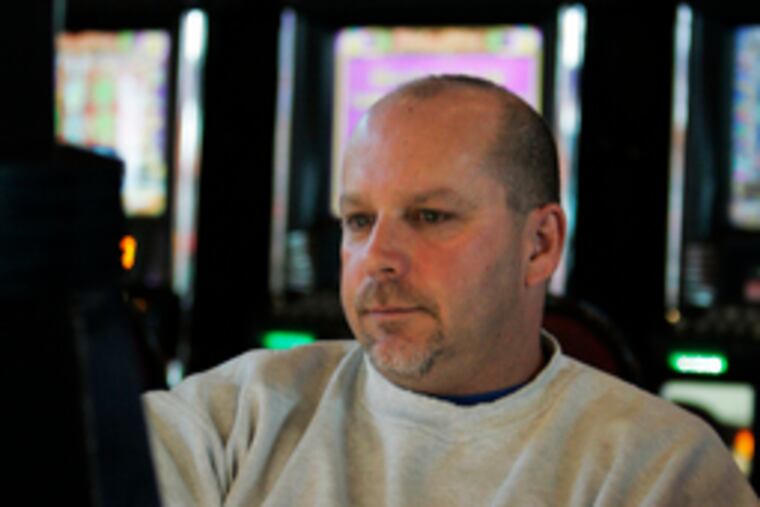Gambling robust in Pa. amid instability
Despite the economy, revenue at slots casinos rose 13% in Nov. This year, Pa. coffers gained $1.32 billion.

Consumers may be cutting back on buying new clothes or going out to eat, but they haven't scaled back their gambling appetite in Pennsylvania.
Despite economists' conclusion last week that the United States has been in a recession since December 2007, six of seven casinos in Pennsylvania had nearly a 13 percent increase in revenue last month compared with the year-ago period.
November slots revenue was $114.7 million, up from $101.6 million in November 2007. The seventh casino, Hollywood Casino at Penn National Race Course in Grantville, opened in February and is not accounted for in the revenue increase.
"You'd think, with the economy the way it is, there would be a slowdown, but I don't see it," said Bensalem Mayor Joseph DiGirolamo, whose township is home to PhiladelphiaPark Casino, the state's top-grossing slots parlor. "I'm amazed."
Taxpayers are sharing in the joy. Between Jan. 1 and Nov. 30, all seven casinos contributed $1.32 billion - 55 percent of their total $2.4 billion take - to state coffers, officials said. The money is then plowed into expansion of the Convention Center in Philadelphia, as well as county budgets and local property-tax relief.
Four of the seven new gambling houses are in impoverished areas with unemployment rates well above the state average in October of 5.4 percent.
The other three casinos are in towns too small to even register their own unemployment rates with the state Department of Labor and Industries, such as East Hanover Township in Dauphin County, and Washington, Pa., about 29 miles from Pittsburgh.
The casino and racetrack in Chester is in a city that had an unemployment rate of 9.3 percent in October and an average household income of $25,703 in the 2000 census, well below the $40,106 state average.
The rosy revenue numbers may owe a lot, industry experts say, to the novelty of the Pennsylvania gaming market, which is barely two years old. The first slots parlor, Mohegan Sun at Pocono Downs, opened in November 2006.
"It's not a surprise," said Michael Pollock, managing director of Spectrum Gaming Group L.L.C., a gambling-consulting firm near Atlantic City. "There is still a newness to it. You are attracting people who view it as the new attraction in the neighborhood, and they're curious to see it."
Not surprising, Pennsylvania's windfall comes at the expense of Atlantic City, where casino revenue dropped 6.3 percent for the first nine months of this year compared with the same period a year earlier, as many former Pennsylvania slots customers were choosing to gamble closer to home.
Would the Pennsylvania casinos' 13 percent jump have been even bigger without the recession? Officials said it was impossible to know in such a young industry, but they were acutely aware of the shifting economy.
"We're cautious at what we're looking at in light of the downturn of the national economy, but really happy with what we are seeing," said Mary DiGiacomo Colins, chairwoman of the Pennsylvania Gaming Control Board, which regulates the state's gambling industry, of the year-over-year revenue increase. "The concept of having regulated gaming all around the state is paying off for us.
"It demonstrates how much revenue we are recapturing back to Pennsylvania that had gone to other jurisdictions," she said.
Temple University psychologist Frank Farley, who has done research on human behavior, risk-taking and thrill-seeking, said a bad economy could spur some people toward gambling for the wrong reasons.
"Things are looking bad, and so why not? Why not try your hand at gambling, because things are bad anyway and you might strike it rich," Farley said. "All it takes is a few jackpots, and it keeps people coming back."
Hope springs eternal in gambler Kenya Wilson's heart. The 38-year-old from Sharon Hill is unemployed and on disability.
"I keep thinking about winning a lot of money," Wilson said last week as she worked a quarter slots machine at Harrah's Chester Casino & Racetrack.
Some gamblers, like Frank Carey of West Chester, are "cutting back" in other ways to keep returning to their favorite casino.
Carey, 45, a general contractor from West Chester, who said business this year was the worst he's seen in 12 years, no longer gambles with his own money and now relies solely on slots coupons that the Chester casino mails him.
The dismal economy has forced him to make another adjustment. "I used to play the dollar slots," Carey said. "Now I'm down to the penny machines. If gas didn't go down, I would not have come here."
Joel Naroff, chief economist at TD Bank and head of Naroff Economic Advisors, of Holland, said the real test of Pennsylvania casinos' staying power would be the new year.
"It will be interesting to see what the first quarter of 2009 looks like compared to the first quarter of 2008," he said. "There's a lot more concern, fear and uncertainty now than there was a year ago."